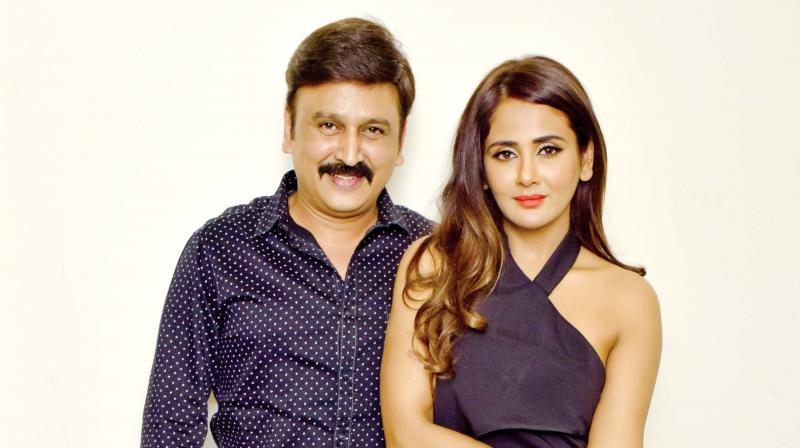The butterfly effect
Our tete-a-tete with the duo was filled with intriguing revelations, copious amount of laughter and more

Butterfly and Paris Paris director Ramesh Aravind and actress-cum-producer of the four multi-lingual films based on the Hindi film Queen, Parul Yadav were at Deccan Chronicle for an exclusive talk... which was warm, enlightening and filled with anecdotes
He’s a seasoned actor, with versatility as one of his great qualities and she is a fire-brand actress, who has done something that no other south Indian heroine has done before. Actor Ramesh Aravind and actress Parul Yadav — the driving forces behind Butterfly, the Kannada version of Kangna Ranaut's Queen, are a delight to converse with. While Ramesh has directed the Kannada and Tamil versions of the film (Butterfly and Paris Paris) Parul’s co-producing the project in the four south Indian languages. Our tete-a-tete with the duo was filled with intriguing revelations, copious amount of laughter and more…
Q How did Butterfly happen?
Ramesh (R): I got a call one day from Yogaraj Bhat saying an actress wanted to talk to me and I was like ‘wow, I rarely get a call like this’ (laughs). Parul spoke to me and said that they’re planning a project in four languages, and they wanted me to direct the Kannada version. Queen is a tale that will work anywhere in the world, and I was keen on directing it in two languages so I felt no stress. I finally met the producer Manu Kumaran and I was on board.
Parul (P): When I watched Queen, I was envious of Kangana and thought I’d never get such a film. The thought of a remake cropped up and I made a few calls. People told me not to do it as no big hero would want to work with me. Finally, I met the current producer who came up with the four-movie idea and asked me to join in as a co-producer.
Q Parul, what did you like most about your character Parvathi? And Ramesh were you apprehensive about comparisons?
P: I could relate to her in many ways especially the climax, when the boy says let’s reconsider, she says, ‘I need to attend a rock concert,’ and goes away — she’s not at all bitter. I was getting goosebumps when I saw it as she’d elevated herself so high that the man didn’t matter to her. I’d done this during a bad relationship where I hugged the guy and said I’d call him and I never did. She was such a nice person that she didn’t even know how to fight, and realised that it was important to be happy first and not just marry. As for the other actresses in our project, they took it up as a challenge despite knowing that we’d be compared to Kangana, and each other.
R: I don’t run the race — I run my own race where I do the best I can. It’s silly to compare yourself with someone else — the only thing you have to compare is what you are and what you can be.
Q What was the most memorable experience from the international shoot?
R: We shot in Paris, Frejus and even Athens. It was one of the best experiences I’ve had. When I’d walk into the set, I’d see 120 people eating lunch together and we’d walk together in Paris and they’d think — oh, India has come to invade us!
P: We took cooks from here, but we still needed uppenkai (pickle), so we’d go to our cameraman who’d take it out of his pocket and give it to us! I hated the mehendi part of the shoot. I borrowed Tamannaah’s mehendi cone and the next day, there was no hint of colour on my hand ‘cos it was so cold there. They had to use a sketch pen to draw on my hand. Even our idlis didn’t turn out well ‘cos there wasn’t enough heat!
Q In KFI, you hardly have an actress leading a movie. Is that too much pressure on you?
P: Women don’t sell on celluloid — I don’t say it’s not happening, but for 100 male-centric movies, the number of women-centric movies are very less. It will happen if audiences go to theatres — then the producer will see the benefit and have the courage to do it. I don’t want to do roles where the lady is dancing around trees and getting her mid-riff pinched and screaming ‘mujhe bachao’!
R: Balasundar and Puttana Kanagal have made women-centric films without stars, that have turned into superhits. Cinema is art but it’s also business. Sensible women-centric films will definitely run.
Q What’s your take on the #MeToo movement?
P: In Mumbai, a few directors have been sacked — it’s very important to punish the assaulter. Kudos to the lady who started the campaign. But in places like Kerala, the fantabulous actresses who spoke up against assault, haven’t been getting work! Something should be done about this. I’d like to see a lifetime ban on people guilty of harassment.
R: When punishment is involved, it’s a warning and at least this will ensure that women will be more respected in the work place and elsewhere.

